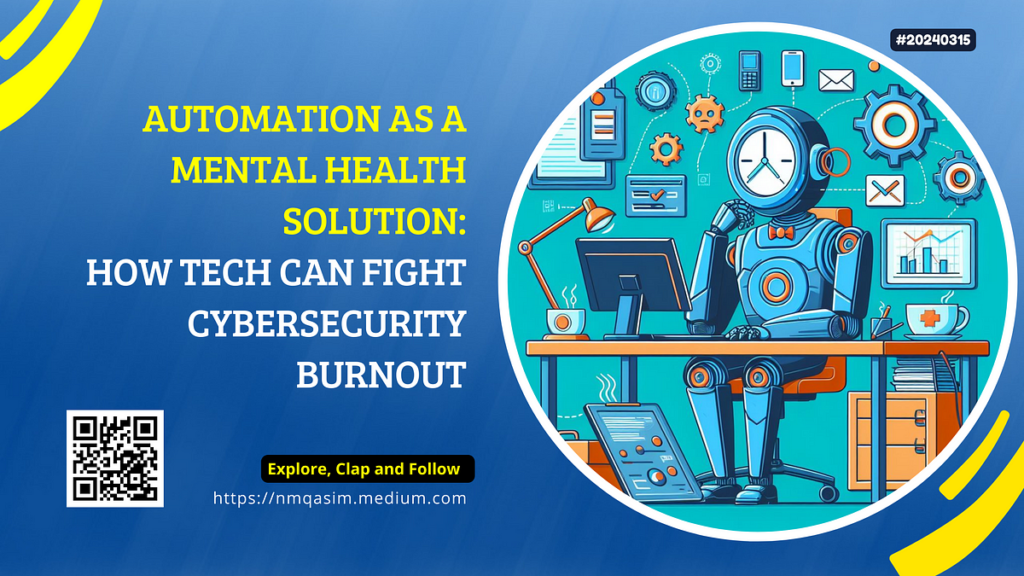Cybersecurity professionals are often the unsung heroes of the digital age, dedicated to protecting data and systems from ever-evolving threats. However, this important mission comes at a cost: increased cybercrime, persistent staffing shortages, and widespread burnout due to overwhelming workloads. In this blog, we delve into the challenges of mental health in the cybersecurity space and explore how automation can pave the way to not only enhance data, but foster the well-being of those monitoring it.
Cybersecurity burnout is a growing concern, with more than half of cybersecurity professionals reporting that their work is having a negative impact on their mental health. The constant “always on” mode required in this field can lead to overwork and burnout, and many cybersecurity leaders feel overwhelmed by the demands of their mission. Stress from work can worsen existing medical conditions, lead to chronic illness, and in some cases lead to suicide. A significant number of professionals are considering leaving their jobs due to stress and burnout, and one-third are considering leaving their jobs within the next two years. This is compounded by the fact that less than a third of his cybersecurity team is fully staffed, and many professionals spend a significant portion of their time doing manual tasks. Masu.
Automation and new managed security services are emerging as mature solutions to combat cybersecurity burnout. By leveraging AI and ML tools, cybersecurity teams can automate repetitive tasks, streamline workflows, and improve operational efficiency. This not only reduces workload, but also improves threat detection accuracy, speeds breach response, and potentially saves millions of dollars. AI can rapidly process and analyze large amounts of data, providing actionable threat intelligence and assisting with various cybersecurity functions such as threat simulation and endpoint management. However, it is important to note that AI systems still require human oversight, although to a lesser extent than legacy systems.
This is where the mental health benefits of automation really become apparent.
- Reduce stress: Automating boring tasks reduces your overall stress and anxiety levels.
- Improved morale: Professionals feel empowered and valued when they focus on complex and fulfilling work.
- Improved retention: Investing in automation and mental health fosters a positive workplace and attracts and retains top talent.
- Overall benefits: A mentally healthy cybersecurity workforce makes an organization more resilient to cyber threats.
Companies need to understand that the return on investment (ROI) of automation is not purely financial.
- Improving employee health and well-being: Research consistently links innovation with increased employee well-being and productivity.
- Reduced cost of sales: Replacing a skilled cybersecurity professional can cost up to 75% of their annual salary. Automation increases retention and saves time training new employees.
- Attract top talent: A reputation for prioritizing mental health makes a company more attractive to the best cyber professionals.
Automation cannot replace human ingenuity in cybersecurity. Instead, it's about empowering humans to do what humans do best: strategic thinking, creative problem solving, and proactive threat analysis. By embracing automation as both a technology and mental health solution, we are building a stronger, more resilient and sustainable cybersecurity industry.
Automation and technology offer promising solutions to the cybersecurity industry's mental health crisis. By automating manual processes, providing managed security services, and fostering a collaborative work environment, organizations can help their cybersecurity teams maintain their mental health and prevent burnout. It is imperative that companies recognize the seriousness of this issue and take proactive steps to support their cybersecurity workforce.
How can your organization leverage automation to prioritize mental health? Start by assessing which tasks are suitable for automation, and invest in tools that truly reduce workload rather than add complexity. To do.
Let's protect the happiness of those who protect us. Automation has the power to transform cybersecurity from a field that causes burnout to one that fosters innovation, growth, and mental health.


